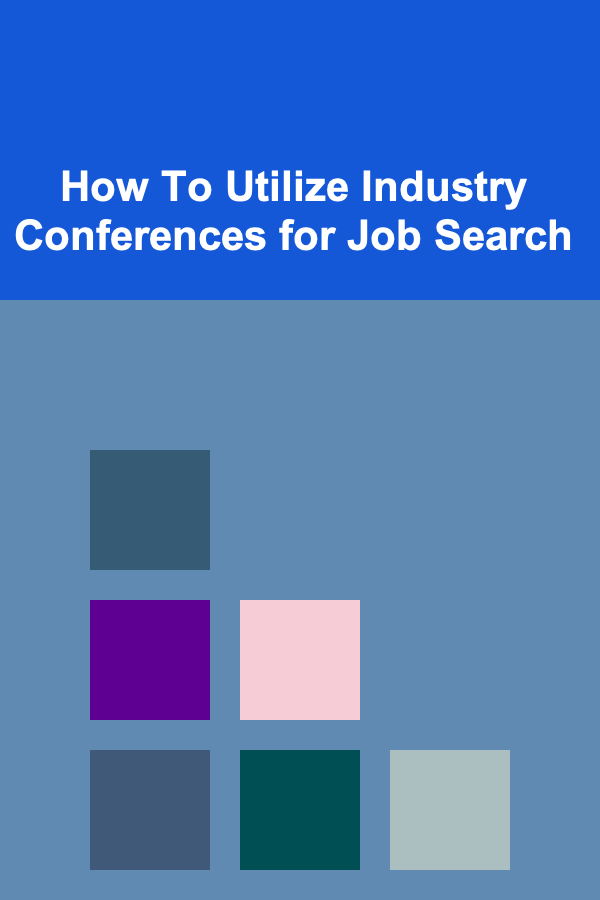
How To Utilize Industry Conferences for Job Search
ebook include PDF & Audio bundle (Micro Guide)
$12.99$8.99
Limited Time Offer! Order within the next:

In the competitive job market, finding the right position can be a challenging process, but leveraging industry conferences as part of your job search strategy is an often underutilized yet highly effective method. These events provide excellent opportunities for networking, skill enhancement, and gaining industry insights, all of which can significantly impact your career trajectory.
This article will explore how you can maximize the value of attending industry conferences to accelerate your job search, providing tips on preparation, engagement during the event, and follow-up strategies that can lead to tangible career opportunities.
Understanding the Value of Industry Conferences
1. Networking Opportunities
Industry conferences attract professionals from various sectors, including top-tier companies, industry leaders, recruiters, and potential employers. Networking at such events is one of the most effective ways to learn about job openings that may not be advertised elsewhere.
By attending conferences, you can:
- Connect with decision-makers in your industry.
- Build relationships with people who can provide job leads, references, and even job offers.
- Expand your professional circle, making it easier to find mentors and industry advocates.
2. Skill Development and Industry Knowledge
Conferences often feature workshops, panel discussions, and keynote speakers who can provide valuable insights into industry trends, new technologies, and best practices. This knowledge can give you an edge over other job candidates and make you more appealing to potential employers.
Additionally, many conferences offer certification opportunities or specialized training that can bolster your resume and make you more competitive in your job search.
3. Exposure to Potential Employers
Many companies use conferences as recruiting platforms. By attending industry-specific events, you increase your visibility among recruiters and employers actively seeking talent. These companies often host booths, sponsor events, or participate in panels, offering a direct channel for potential candidates to learn about job openings.
Preparing for the Conference
1. Research the Conference and Attendees
Preparation is key to making the most of any conference. Start by thoroughly researching the event. Identify the speakers, exhibitors, and sponsors. Look for companies or individuals that align with your career goals. Understanding the scope of the conference will help you plan your schedule and prioritize the sessions and networking opportunities that are most relevant to your job search.
Things to research before attending:
- Keynote Speakers and Presenters: Who are the prominent figures in your field? Is there anyone you would like to connect with directly?
- Exhibitors and Sponsors: Which companies are exhibiting, and do they align with your career interests? Many exhibitors also have job openings and are looking for talent.
- Schedule: What sessions, panels, and workshops are available, and which ones would benefit your skill set or career knowledge the most?
2. Prepare Your Personal Brand
Your personal brand is critical at any conference, especially if you are job hunting. Prior to the event, make sure your online presence, such as your LinkedIn profile and personal website, is polished and up-to-date. In addition, have a solid elevator pitch prepared---a brief, compelling statement that explains who you are, what you do, and what you are looking for.
Tips for preparing your personal brand:
- LinkedIn Profile: Ensure your LinkedIn profile is updated with your most recent skills, experiences, and achievements. Ensure your profile photo is professional, and your headline clearly communicates your value.
- Resume and Portfolio: Bring multiple copies of your resume and, if applicable, a portfolio showcasing your work. Tailor your resume to fit the industry you are targeting.
- Elevator Pitch: Prepare a concise pitch that you can deliver comfortably in under two minutes. Highlight your skills, experience, and what type of role you're seeking.
3. Set Clear Objectives
Before the event, define what you want to achieve. Are you seeking job leads, building relationships with industry leaders, or gaining new skills? Having clear objectives will help you stay focused and make the most of your time at the conference.
Common conference objectives include:
- Networking with potential employers: Establish direct contacts with hiring managers or recruiters who can offer you a job or pass along your resume to the right people.
- Learning about job opportunities: Research companies with job openings that match your skill set and interests.
- Gaining insights into industry trends: Attend workshops or presentations that will deepen your understanding of current developments in the industry.
Maximizing Engagement During the Conference
1. Attend Networking Sessions
Most conferences will include designated networking events such as happy hours, mixers, or coffee breaks. These are your opportunities to interact with industry professionals in a more casual setting. Be proactive---introduce yourself to new people, ask about their experiences, and offer your own insights. Networking is not just about what others can do for you; it's about building genuine relationships based on mutual interests.
Networking strategies:
- Introduce yourself confidently: Offer a firm handshake, make eye contact, and provide a brief introduction.
- Ask insightful questions: Engage people in conversations that go beyond small talk. Ask about their work, challenges, and views on industry trends.
- Follow up on connections: After the event, send personalized connection requests on LinkedIn or follow up via email to continue the conversation.
2. Participate in Workshops and Panels
Workshops and panel discussions offer valuable learning experiences and a chance to engage with experts. When participating, ask thoughtful questions and contribute to discussions. This not only shows your interest in the subject but also positions you as an active participant, which can help you stand out in the crowd.
How to engage during workshops and panels:
- Ask questions: Make sure your questions are well thought out and show your expertise or curiosity in the subject matter.
- Interact with speakers: After the session, approach the speaker with a follow-up question or comment. This can help you build rapport and make a lasting impression.
3. Visit Exhibitor Booths
Exhibitor booths are prime opportunities for discovering job openings. Companies often set up booths to showcase their products, services, and hiring needs. Approach recruiters with a clear introduction, express interest in their company, and ask if they have any current job openings. You may be able to hand over your resume, or even get a direct referral for job opportunities.
Tips for visiting exhibitor booths:
- Be prepared: Have your resume ready and tailored to the specific company you're approaching.
- Ask about job openings: Don't be shy to inquire about any open positions, internships, or projects you could get involved with.
- Show interest in their company: Do your research on the company beforehand, so you can ask informed questions and engage in meaningful conversations.
4. Build Relationships with Fellow Attendees
While networking with employers is important, don't forget about the potential value of fellow attendees. You may find other job seekers who are attending for similar reasons, or individuals who can offer career advice, mentorship, or valuable connections. Building relationships with peers can often lead to unexpected opportunities.
Building peer relationships:
- Exchange contact details: Don't hesitate to exchange LinkedIn profiles or business cards with fellow attendees.
- Collaborate and support: Offer your help or advice where possible. Collaboration can create strong professional bonds.
Follow-up After the Conference
1. Send Thank-You Notes
Follow-up is essential after any conference. Within 24-48 hours, send personalized thank-you emails to those you met, including speakers, recruiters, and fellow attendees. This shows professionalism and gratitude, and it keeps you on their radar for any future opportunities.
What to include in your thank-you note:
- Express appreciation for their time and insights.
- Reiterate your interest in staying connected.
- Mention something specific from your conversation to help jog their memory.
2. Continue Building Connections on LinkedIn
LinkedIn is a powerful tool for continuing the conversations you started at the conference. After sending your thank-you notes, follow up by connecting with the individuals you spoke to. Include a personalized message reminding them of your interaction at the conference.
LinkedIn follow-up tips:
- Send a message that references your conversation.
- Offer any additional resources or insights you may have discussed.
- Stay active on LinkedIn by sharing relevant content and engaging with your connections' posts.
3. Review Your Notes and Take Action
Review the notes you took during the conference. This will allow you to identify key takeaways, potential job leads, and action items. Prioritize the connections you made and take action on the most promising opportunities. For example, reach out to recruiters, apply for positions discussed, or schedule informational interviews with individuals you met.
Action steps might include:
- Apply for job openings: Follow up on job leads you received during the conference and submit tailored applications.
- Schedule informational interviews: Reach out to people you want to learn from and ask if they would be willing to chat about their career paths or the industry.
- Research companies: Take the time to explore companies you were introduced to and look for further opportunities within them.
Conclusion
Industry conferences can play a pivotal role in your job search strategy. By approaching these events with preparation, an engaging attitude, and a follow-up plan, you can maximize your chances of securing new job opportunities, expanding your network, and staying ahead in your field. Whether you're looking for a job, seeking advice, or simply wanting to stay updated on industry trends, the value of attending these conferences cannot be overstated. So, the next time you have the chance to attend one, embrace the opportunity, and leverage it for your career advancement.

How to Invest for Retirement: 401(k) vs. IRA
Read More
How to Make Money Using Deep Learning
Read More
How to Make Money with Deep Learning in E-commerce
Read More
How to Make Your Home Party More Enjoyable with DIY Decorations
Read More
How to Start Saving Money on Household Bills: Easy and Effective Strategies
Read More
Decoding the Temperature Code: How to Identify the Best Serving Temperature for Wine
Read MoreOther Products

How to Invest for Retirement: 401(k) vs. IRA
Read More
How to Make Money Using Deep Learning
Read More
How to Make Money with Deep Learning in E-commerce
Read More
How to Make Your Home Party More Enjoyable with DIY Decorations
Read More
How to Start Saving Money on Household Bills: Easy and Effective Strategies
Read More